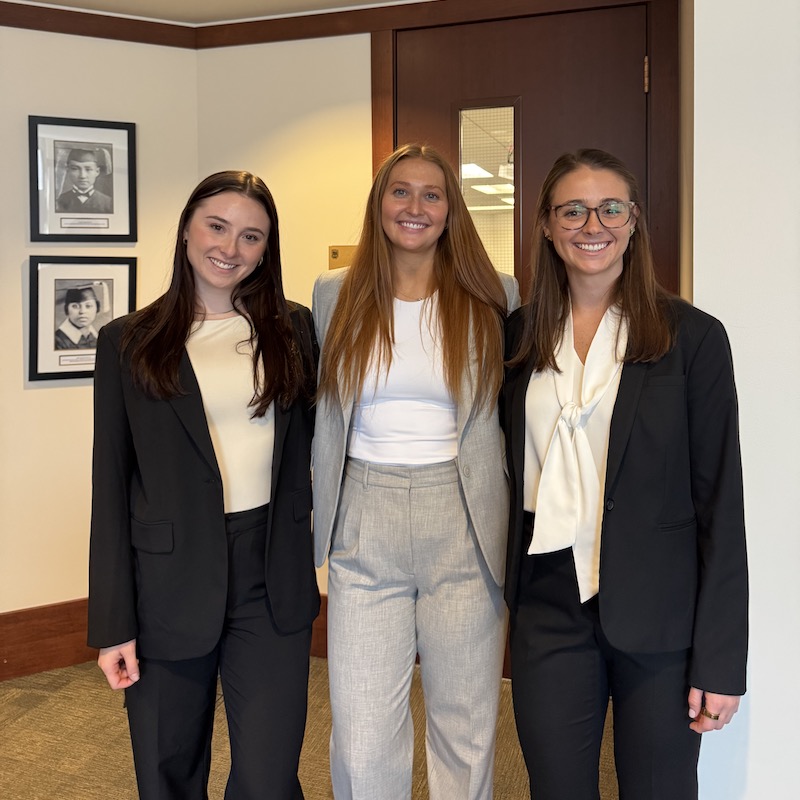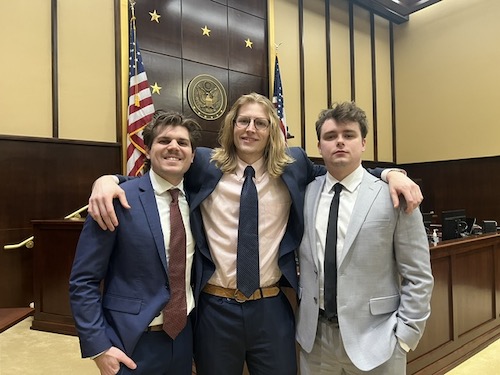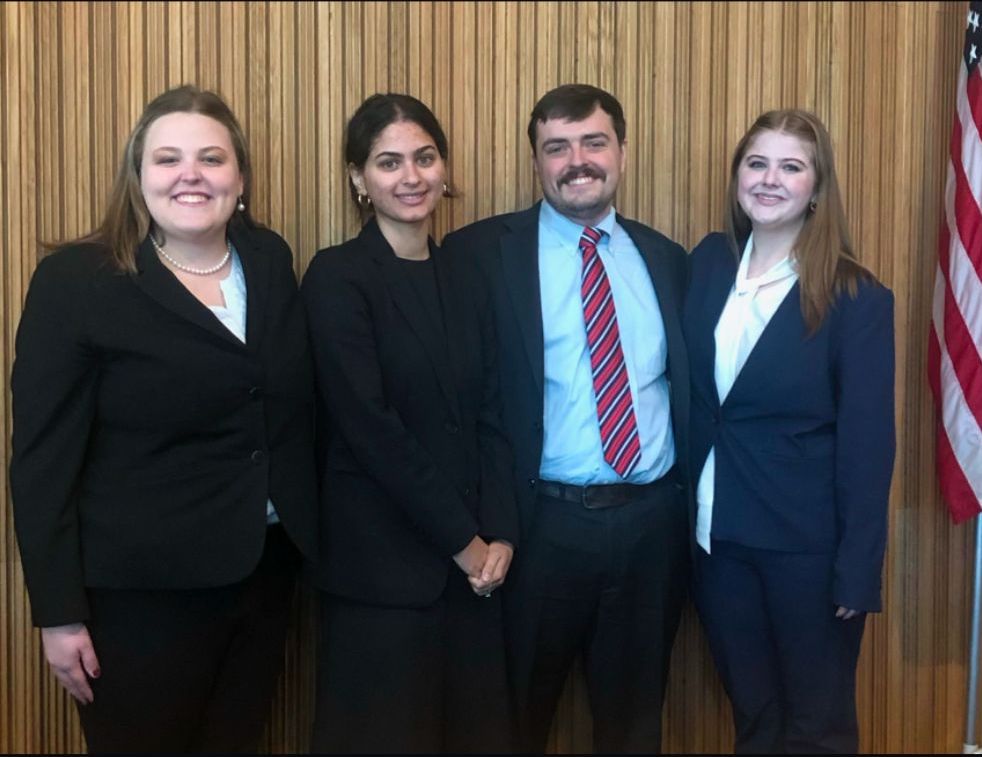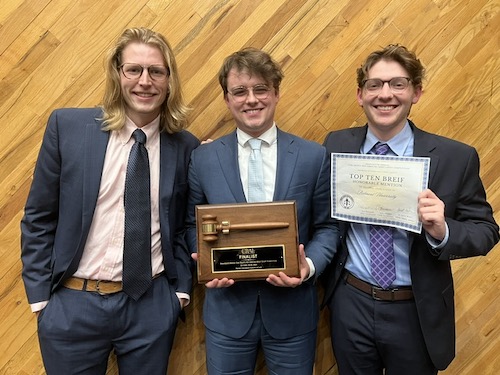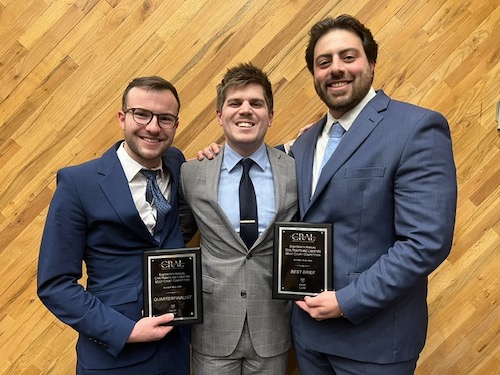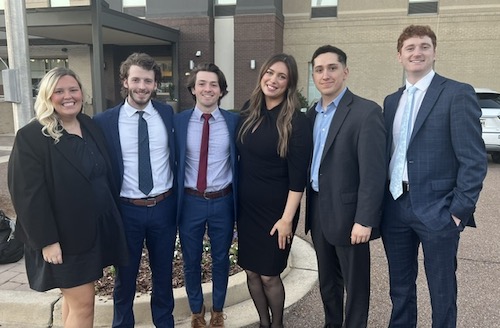Nationally ranked advocacy teams help prepare practice-ready lawyers
Belmont Law’s Board of Advocates ended the 2024-2025 advocacy competition season on a high note, ranking in several national competitions throughout the year.
Under the leadership of Amy Moore, professor of law and director of advocacy, the Board of Advocates provides students with invaluable opportunities to hone their legal advocacy skills through competitive experiences before entering the profession, further supporting Belmont Law’s commitment to developing practice-ready lawyers.
What is the Board of Advocates?
The Board of Advocates is an organization that develops law students’ advocacy skills through competitions. The teams that make up the Board of Advocates have continuously delivered high results, outperforming established legal competitors across the nation.
This success has played a valuable role in establishing Belmont Law's reputation within the legal community, particularly during its early years.
"Early on, we were able to make a name for ourselves in advocacy where we couldn't quite yet make a name in some other areas," Moore explained, referring to the period when the College was still seeking full ABA accreditation.
Each year, Belmont Law students dedicate substantial time to preparing for advocacy competitions while balancing rigorous academic requirements.
“The experience is demanding and rewarding,” stated Smith Hart, 2L and member of Belmont’s nationally ranked moot court team. “Our team probably put more time and effort into Board of Advocates this semester than we did any other activity in law school. I also don’t think there’s a better way to prepare for being a lawyer, whether that’s through moot court, mock trial or our transactional team.”
Three different types of teams compete through the year:
- Moot Court - Focuses on appellate advocacy, where students write briefs and present oral arguments before mock appellate courts
- Mock Trial - Simulates trial-level proceedings with juries, requiring students to manage evidence and develop courtroom presentation skills
- Transactional Team - Provides experience in non-litigation settings, such as pitching to executive boards about why a client should hire their law firm for specific tasks
The competitive variety within the Board of Advocates allows students to explore various legal career paths while developing skills that are essential for whatever path they choose. Moore continuously reminds her students that, “Advocacy is a life skill for a lawyer.”
"Even if you don't end up in the courtroom, you still have to answer questions about the law to the partner, the client, your colleague," Moore explained. “Even in the transactional track they're still working as lawyers, but they're talking to a board of executives rather than competing against others.”
The Competition Process
First-year law students are introduced to advocacy competitions in their required Legal Information and Communications course. The briefs and oral arguments from the top performers serve as a qualifier to participate in the Dean’s Cup, an internal tournament that brings in judges from the Court of Appeals and the Supreme Court of Tennessee.
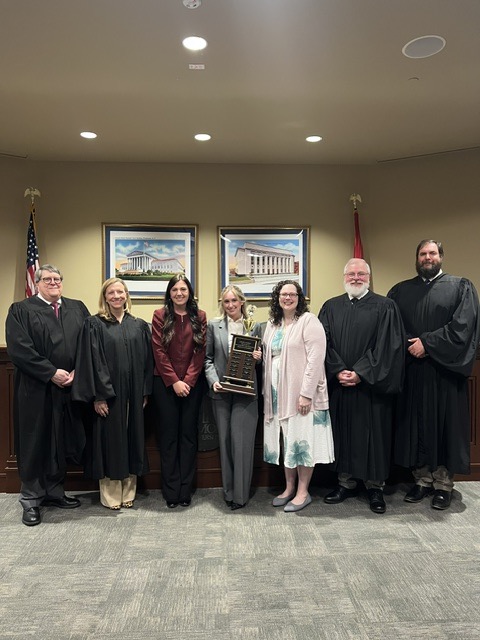
The Dean's Cup gives early exposure to high-level legal professionals, serving as a benefit for participants.
Following their first year, students interested in the Board of Advocates can join the Summer Program to pursue their preferred advocacy track. This six-week program culminates in auditions — oral arguments for moot court, closing arguments for mock trial and presentations for the transactional teams. From these auditions, coaches select approximately 40 students each year to represent Belmont Law in various competitions.
"It is a lot to balance," Moore acknowledged. "I tell students in the first year of law school to focus on learning how to do law school.”
Although students receive course credit for up to two competitions, many choose to participate in more without additional credit.
Beyond advocacy skills, students gain extensive knowledge in specialized areas of law that may not be covered in-depth in their regular coursework. This specialized knowledge becomes a valuable talking point during job interviews and creates networking opportunities with competitors from other schools.
"In interviews later, people always want to know about competitive advocacy," Moore shared. "It's a very unique networking opportunity.”
A Coach’s Outstanding Service to Students
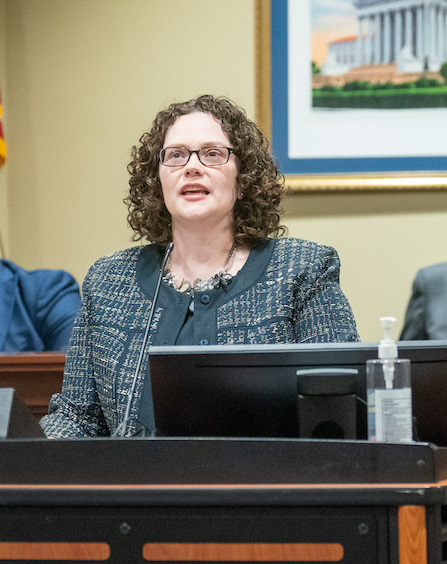 This year, Moore was named a finalist for the prestigious 2025 Presidential Faculty Achievement Award for her outstanding service to students both in and out of the classroom.
This year, Moore was named a finalist for the prestigious 2025 Presidential Faculty Achievement Award for her outstanding service to students both in and out of the classroom.
Under Moore's leadership, Board of Advocates members receive mentorship and support. She meets with students individually to refine their arguments, conducts team meetings and organizes practice sessions where teams can test their skills against each other.
Beyond prep for competition, Moore is committed to ensuring students’ success, even making herself available beyond the traditional scope of the classroom.
Samantha McCaleb is Belmont Law's first federal appellate clerk (U.S. Court of Appeals for the Eighth Circuit). When McCaleb needed to take Moore's Federal Courts class — which wasn't being offered that semester — Moore arranged an independent study to ensure the student was properly prepared.
“Professor Moore’s dedication to her students and Moot Court team is unmatched,” McCaleb said. “She has pushed me to become not only a better lawyer, but a better person, and I would not be where I am today without her.”
Mentorship often creates lasting relationships that extend well beyond graduation. Patrick Riley, an alumnus and former moot court student, now serves as assistant coach alongside Moore — a testament to the program's impact.
For Moore, the most rewarding aspect is watching students grow.
"To see them blossom over the time period from where they start to where they end is very rewarding," she reflected. "The whole point of Belmont is to create practice-ready lawyers, and to see them become practice-ready while they're still students is very satisfying.”
Moot Court Season Results
For moot court, the top-ranking team was ultimately 9th in the country. This team competed against more than 190 teams at the National Appellate Advocacy Competition sponsored by the American Bar Association. The team consisted of Smith Hart, Alexander Lanham and Will Sosna. The other team Belmont sent to the NAAC were regional finalists, consisting of Elizabeth Castillo, Ben Tandy and Kealy Welage. Kealy Welage received an individual advocacy award.
Earlier in the year, moot court sent two teams to the Emory Civil Rights and Liberties Competition. One team — consisting of Patrick Gaga, Carter Gibb and Alexander Lanham — were national quarterfinalists and won an award for the best brief. The other team — consisting of Smith Hart, Will King and Will Sosna — were national finalists and also received a brief award and individual advocacy awards.
At the McGee National Civil Rights Moot Court Competition, Sarah Parker and Zach Sterne were crowned as the champion team and received the National 2nd Best Brief award. Sterne received an individual award for National Best Oral Advocate. Parker received an individual award for National 2nd Best Oral Advocate.
Moot Court also sent a team to the National Moot Court Competition at the regional level with Tate Blunt, Mary Farris and Brandyn Kirby. They placed in the top ten of the region.
Mock Trial Season Results
For mock trial, at the American Association of Justice Student Trial Advocacy Competition, the mock trial team consisting of Caroline Caldwell, Garrett Hamrick, Taylor Patton and Isaac Selz was named regional semifinalists.
Two mock trial teams also competed in the regional rounds at the National Trial Competition in Montgomery, Al. The teams consisted of Peyton Godfrey, Jackson Hasty, Abby Morse, Jordyn Price, Madeline Saltsman and Heidi Woll.
In the fall, mock trial sent a team to the Syracuse National Trial Competition, consisting of Emily Amin, Caroline Caldwell, Jackson Hasty, and Taylor Patton. This team advanced to the national semifinals.
Transactional Team Season Results
For the transactional practice, ranking 5th in the nation at the L. Edward Bryant, Jr. National Health Law Transactional Competition sponsored by Loyola University, the transactional team consisting of Jessica Martin, Kendall McMullen and Mary Kate Tumelty defeated 21 teams across the country including LSU, Georgia State University Law School and the University of Tennessee. Cameron Campbell also won third place in the Roy Snell Regulatory & Compliance Writing Competition.
Learn more about the Belmont Law!


